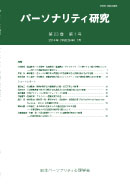Volume 23, Issue 1
Displaying 1-10 of 10 articles from this issue
- |<
- <
- 1
- >
- >|
Article
-
Article type: Article
2014 Volume 23 Issue 1 Pages 1-12
Published: July 30, 2014
Released on J-STAGE: August 26, 2014
Download PDF (444K) -
Article type: Article
2014 Volume 23 Issue 1 Pages 13-28
Published: July 30, 2014
Released on J-STAGE: August 26, 2014
Download PDF (478K) -
Article type: Article
2014 Volume 23 Issue 1 Pages 29-37
Published: July 30, 2014
Released on J-STAGE: August 26, 2014
Download PDF (384K)
Short Report
-
Article type: Short Report
2014 Volume 23 Issue 1 Pages 38-41
Published: July 30, 2014
Released on J-STAGE: August 26, 2014
Download PDF (244K) -
Article type: Short Report
2014 Volume 23 Issue 1 Pages 42-45
Published: July 30, 2014
Released on J-STAGE: August 26, 2014
Download PDF (283K) -
Article type: Short Report
2014 Volume 23 Issue 1 Pages 46-48
Published: July 30, 2014
Released on J-STAGE: August 26, 2014
Download PDF (236K) -
Article type: Short Report
2014 Volume 23 Issue 1 Pages 49-52
Published: July 30, 2014
Released on J-STAGE: August 26, 2014
Download PDF (273K) -
Article type: Short Report
2014 Volume 23 Issue 1 Pages 53-56
Published: July 30, 2014
Released on J-STAGE: August 26, 2014
Download PDF (268K) -
Article type: Short Report
2014 Volume 23 Issue 1 Pages 57-59
Published: July 30, 2014
Released on J-STAGE: August 26, 2014
Download PDF (313K) -
Article type: Short Report
2014 Volume 23 Issue 1 Pages 60-63
Published: July 30, 2014
Released on J-STAGE: August 26, 2014
Download PDF (312K)
- |<
- <
- 1
- >
- >|
